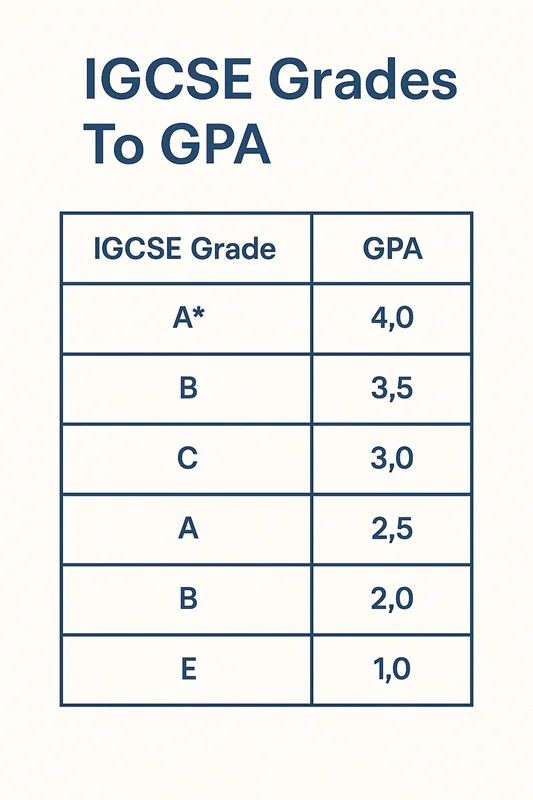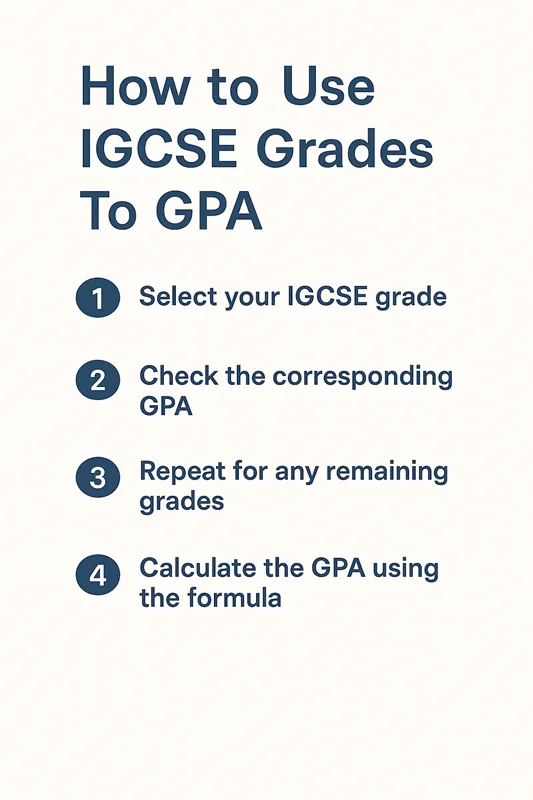Convert your IGCSE grades to U.S. GPA instantly
Converting your IGCSE grades to the U.S. GPA system can feel overwhelming, especially when you’re applying to American universities. Whether you’ve completed the 9–1 or A*–G grading scale, this guide will walk you through the exact conversion process, provide clear tables, and answer the most common questions international students ask.
The International General Certificate of Secondary Education (IGCSE) is a globally recognized qualification for students aged 14-16. Cambridge Assessment International Education and Pearson Edexcel are the main exam boards offering IGCSE qualifications.
IGCSE uses two main grading systems:
Many students still have qualifications from the A*–G system, particularly those who completed IGCSE before 2017-2019 (implementation varied by subject and exam board).
The Grade Point Average (GPA) is the standard academic measurement system used by American high schools and universities. The most common scale runs from 0.0 to 4.0, where:
Some schools use weighted GPAs that go above 4.0 for honors or AP courses, but the standard 4.0 scale is what most universities reference for admissions.
Your GPA is calculated by averaging all your course grades, with each course typically weighted equally unless specified otherwise.

Converting IGCSE grades to GPA requires understanding that there’s no single “official” conversion method. Different universities and credential evaluation services may use slightly different scales. However, here’s the most widely accepted approach:
Determine whether your IGCSE certificates use the 9–1 or A*–G system.
Use the tables below to convert each individual IGCSE grade to its GPA equivalent.
Add up all your converted grades and divide by the number of subjects.
Formula: Total GPA Points ÷ Number of Subjects = Overall GPA
Sarah has the following IGCSE grades:
Calculation: (3.7 + 3.3 + 4.0 + 3.0 + 3.3) ÷ 5 = 17.3 ÷ 5 = 3.46 GPA
James has the following IGCSE grades:
Calculation: (4.0 + 3.7 + 3.3 + 3.7 + 3.3) ÷ 5 = 18.0 ÷ 5 = 3.60 GPA
IGCSE Grade | Performance Level | GPA Equivalent |
9 | Exceptional | 4.0 |
8 | Strong | 3.7 |
7 | Good | 3.3 |
6 | Competent | 3.0 |
5 | Strong Pass | 2.7 |
4 | Standard Pass | 2.3 |
3 | Below Standard | 2.0 |
2 | Weak | 1.3 |
1 | Very Weak | 1.0 |
U | Unclassified | 0.0 |
IGCSE Grade | Performance Level | GPA Equivalent |
A* | Outstanding | 4.0 |
A | Excellent | 3.7 |
B | Good | 3.3 |
C | Satisfactory | 3.0 |
D | Below Average | 2.3 |
E | Weak | 2.0 |
F | Very Weak | 1.3 |
G | Unclassified | 1.0 |
U | Unclassified | 0.0 |
Important Note: These conversions are approximations. Always check with your target university’s admissions office for their specific conversion methods.
While manual calculations work perfectly well, several online tools can speed up the conversion process:
Remember that these tools provide estimates. For official transcripts, you may need professional credential evaluation services like WES, ECE, or AACRAO.
Based on the conversion table, Grade 6 = 3.0 GPA and Grade 7 = 3.3 GPA. If you have an equal mix, your GPA calculation would be approximately 3.15, which is competitive for many U.S. universities.
Your grades convert to approximately 3.8 GPA (4.0 + 4.0 + 3.7 + 3.7 + 3.3 ÷ 5). This places you in the top 15-20% of American high school students and makes you competitive for selective universities.
American universities generally view IGCSE positively because it’s internationally standardized and rigorous. The key is demonstrating strong performance regardless of the curriculum.
Consider retaking only if you have grades below 4 (or C in the old system) and you’re applying to highly competitive programs. Focus your energy on SAT/ACT preparation and extracurriculars instead.
Calculate IGCSE and A-Level GPAs separately, then take a weighted average based on the number of courses in each system. Some universities may evaluate them as separate academic periods.
Understanding how IGCSE compares to other international and American systems helps contextualize your academic profile:
Performance Level | IGCSE (9-1) | IGCSE (A*-G) | A-Level | IB | AP | US GPA |
Exceptional | 9 | A* | A* | 7 | 5 | 4.0 |
Strong | 8 | A | A | 6 | 4 | 3.7 |
Good | 7 | B | B | 5 | 3 | 3.3 |
Competent | 6 | C | C | 4 | 3 | 3.0 |
Standard Pass | 5 | C | D | 4 | 2 | 2.7 |
American universities understand that IGCSE is typically a prerequisite for more advanced qualifications like A-Levels or IB. Strong IGCSE grades demonstrate solid foundational knowledge and readiness for advanced study.

No. Each university may have slightly different conversion methods. Some use third-party evaluation services, while others have internal conversion scales. Always check with admissions offices for specific requirements.
Generally, no. Submit your official IGCSE grades as they appear on your certificates. Universities will handle the conversion internally or through credential evaluation services.
Universities typically look at:
Taking additional subjects with strong grades can positively impact your overall academic profile, but it won't retroactively change grades you've already earned.
Universities are familiar with both systems and don't show preference. What matters is strong performance within whichever system you completed.
Merit-based scholarships often have GPA thresholds. A converted IGCSE GPA of 3.5+ typically meets competitive scholarship requirements, though specific criteria vary by institution.
For highly competitive programs or if your target universities require it, professional evaluation services like WES or ECE can provide official GPA conversions that carry more weight than self-calculations.
Converting IGCSE grades to GPA serves as a helpful reference point, but remember these key principles:
Your IGCSE grades are just one component of your university application. Strong essays, extracurricular activities, recommendation letters, and standardized test scores all contribute to creating a compelling application profile.
Focus on presenting your academic achievements authentically and demonstrating how your international education experience has prepared you for success in American higher education.
Remember: IGCSE qualifications are widely respected by U.S. universities. Strong performance in this system demonstrates academic capability and international perspective that many institutions actively seek in their student bodies.